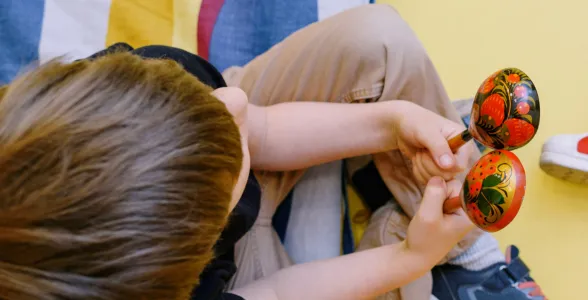
ADHD Awareness Month
October is ADHD Awareness Month and I want to use this opportunity to share some information on ADHD and my personal experiences of having and being diagnosed with it. I will also share some ideas for how music can help people with ADHD in daily life and how we might work in music therapy sessions to support people with ADHD.
Often our stereotypical view of ADHD can be around young boys who struggle to sit still in class and might be classed as ‘troublemakers’. This is largely thanks to structural bias in historical psychological research and the medical model of psychiatry, but also because these children tend to show their ADHD traits much more externally and to have more of an impact on the people around them at home and school. Because of this they might be referred for diagnosis and offered support sooner.
However, we are currently seeing that a large number of people are being diagnosed with ADHD in adulthood and many of these are women who feel that their symptoms may have been missed as children. We also know that neurodiversity (including autism and ADHD) often tend to be inherited, so as more children are diagnosed and finding support, their parents are often finding that the symptoms apply to them too and might explain many of the things they have struggled with throughout their lives.
I was diagnosed with ADHD last year and told that I am probably autistic too (which I now self-identify as), and as a woman in my 30s I am one of those who slipped through the net earlier in life. I was lucky to be very capable academically and had great support from my family to keep me on track throughout school. It was when I entered the world of independent study and then started my career and independent life that I felt myself struggling with initiating and focusing on tasks, being organised and feeling in control of my brain. I started to read up on how ADHD can often present in people assigned female at birth and everything clicked for me.
For some people, the hyperactivity part of ADHD can be more internal than external - thinking about a thousand things at once without being able to settle to focus on one of them, missing what people are saying because your attention is focused on your thoughts, feeling completely paralysed and overwhelmed when trying to start a seemingly simple task, and being unable to switch off and relax (often because you are worrying about everything you haven’t got done). ADHD can also mean having problems with judging how much time has passed and how long tasks will take, often leading to chronic lateness and all the stress and shame that comes with this. There is also a sense of ‘out of sight, out of mind’ - we really don’t mean to forget about things but if we can’t see a visible reminder and our attention switches to something else then it will disappear.
The journey to diagnosis was challenging, as NHS services are hugely oversubscribed and waiting lists can be years long. I was able to request a diagnostic assessment through the NHS Right To Choose process after a friend told me about this little known system, and after waiting a few months I had a very surreal online appointment on a Sunday evening after a busy day spent performing with my choir! As a mental health professional, I could notice the psychiatrist asking me questions to rule out other mental health diagnoses, and he asked me for my own opinion before confirming the diagnosis and speaking very powerfully about how neurodivergence can be such a challenge but also a unique way of experiencing the world.
When I was diagnosed, I felt a sense of relief that I had an explanation for things I had struggled with and felt guilty for, but also worked through a lot of varied feelings as I processed the news, supported by my friends, family, supervisors and personal therapist. I thought about how far I had come from thinking of autism and ADHD in very stereotyped ways which seemed a million miles away from my own lived experience, to learning and knowing that I am in fact part of a community of neurodivergent people navigating a neurotypical world and society. I have since started taking medication for my ADHD, and while I am still figuring out the best dosage and type of medication for me, when the medication is working well I can feel a sense of clarity and focus that totally amazes me and helps me to actually do the work I am capable of. I can often struggle with the administrative side of working as a music therapist, but have also found that my ADHD can be really helpful in my clinical work, in helping me to make quick connections between things that happen in sessions, being able to be flexible in my approach to leading groups and taking part in improvisations, and even to recognise patterns in songs and music (I can spot a similar chord pattern between songs a mile off!).
Music and ADHD
Music is one of many things that can help people with ADHD to get started and focus on tasks. The underlying mechanism of ADHD involves low levels of dopamine in the brain, meaning it is understimulated and searches for stimulation in whatever form it can get. This means that sometimes being in silent situations with little input can make things even more difficult for ADHDers, and is why things like stim toys, movement breaks and other sensory input is so important and helpful. I often find myself feeling the familiar ADHD paralysis when trying to get started on a task, and putting on some of my favourite music or the radio can give my brain the stimulation it needs to overcome this and allow me to get going.
Music can also help with the time blindness people with ADHD face. Having an audible stimulus like music can help people to keep track of how much time has passed, particularly when listening to pop and rock songs which tend to last for 3-4 minutes each. The end of songs can create a natural transition moment and mark the end of a rest period or step of a task.
When working with someone with ADHD in music therapy, within a neurodiversity affirming approach we would not be trying to ‘fix’ a client’s ADHD, but to practise skills to help them feel more confident and in control of their daily lives. We might use a Neurologic Music Therapy technique called Musical Executive Function Training (MEFT), in which we use musical tasks such as songwriting and music production to work on executive functioning skills, such as planning, choosing and completing rewarding and creative projects. We might also use Musical Attention Control Training (MACT), where the client listens for musical cues and changes their playing in response to these. For example, when the therapist plays the higher notes on the piano, they need to play on the wind chimes and when the therapist plays lower notes they will need to play on the drum. These exercises can be made gradually more complex and designed to work on different types of attention, including sustained, selective, divided, alternating and joint attention. These can be particularly fun when working with children and in groups!
Written by Laura Cook, Music Therapist at Chiltern Music Therapy
If you would like to learn more about the lesser known ways in which ADHD and autism can present, how to practise in a neurodiversity affirming way and how to support people with ADHD in music therapy, Laura will be running a training event soon with Alice Nicholls, another Chiltern Music Therapist who also has ADHD and self-identifies as autistic. The training will take place online on 29th November 2022 and further information is available here.
Support our Work
Help us to provide Music Therapy to the most vulnerable and isolated members of our society
Donate here

.webp)


.png)